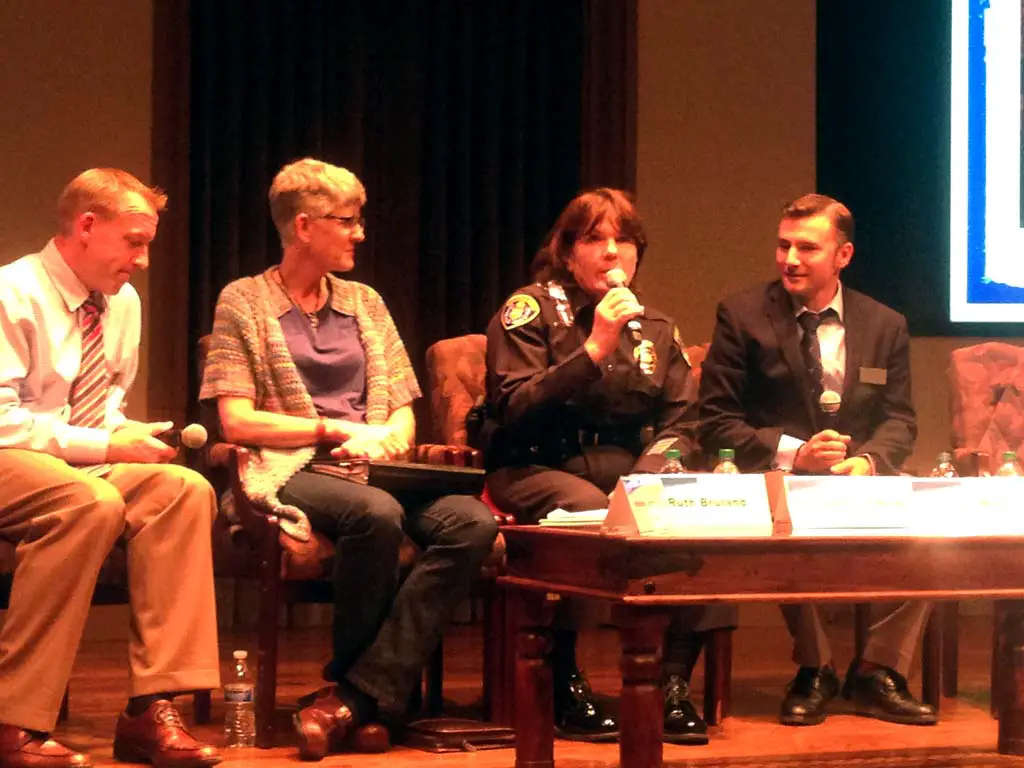REGION—San Diego is world-renowned for the zoo, the amazing weather and the beaches. However, it’s also home to the fourth largest homeless population in the country, according to Ruth Bruland, executive director at St. Vincent de Paul Village.
Bruland took part in a panel discussion on Wednesday night talking about how to be a “good neighbor” at an event held at the University of San Diego, and co-sponsored by KPBS.
The event was part of St. Vincent de Paul’s Good Neighbor Month, which aims to raise awareness about homelessness in San Diego.
Bruland said there are about 8,500 homeless people in San Diego and it’s home to the largest population of homeless veterans in the nation.
She said the efforts of St. Vincent de Paul aim towards getting homeless people income and housing.
“The success that matters to us, and frankly to one of our major funders, (the U.S. Department of Housing and Urban Development), is this placement into permanent housing,” said Bruland, “and in order to do that, there has to be some way for that rent to be paid.”
Head of the Homeless Outreach Team with the San Diego Police Department, Lt. Debbie Ferrar, also spoke at the panel about the department’s tactics in dealing with the homeless.
“Dealing with homeless is not an event, it’s a process,” said Ferrar.
She preaches compassionate enforcement to her officers.
After the case Spencer v. San Diego went to the Supreme Court, said Ferrar, officers are no longer able to issue tickets to homeless people, simply for being homeless, unless adequate shelter is available.
San Diego also offers a storage space for the homeless to store their belongings, which Ferrar said, allows them to safely go to job interviews and not have to worry about their possessions.
She went on to talk about the costs related to services the homeless receive.
“To give somebody something for free seems counterintuitive, until you look at the numbers, and it actually makes more sense to house people and pay for that because you pay less in services,” said Ferrar.
If people want to donate to the homeless, she recommended giving to a charity that helps the homeless, instead of directly to the people.
Bruland addressed the stigma of substance abuse among homeless people and said that 31 percent of the homeless population in San Diego has a high level of substance abuse, according to St. Vincent de Paul’s most recent survey.
“There is a fine line between giving charity and enabling people,” said Ferrar.
Bruland discussed the difficulties homeless have in getting permanent housing in San Diego, saying that high rent is a huge factor.
St. Vincent de Paul’s offers transitional housing, with a maximum stay of 12 months.
The organization also offers permanent housing, and, according to Bruland, 91 percent of the people that use permanent housing eventually move into unsubsidized housing.
The panel also addressed people’s attitudes toward homelessness and concluded there needs to be a fundamental shift in the way everybody needs to think about it.
Ferrar said that in a lot of complaints she receives people ask, ‘can’t you just make them go away?’
Another panelist, Everard Meade, director of the Trans-Border Institute at USD, provided an answer.
“People just don’t disappear, it doesn’t matter if we’re talking about incarcerating people or putting people from one jurisdiction to the next and moving people out of space,” said Meade, ”they’re not gone, they’re still part of our society.”

